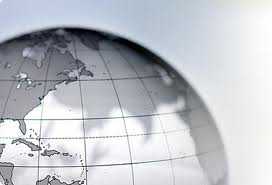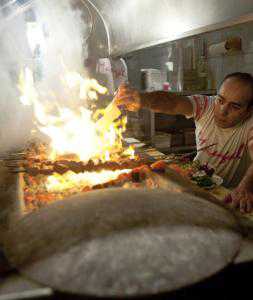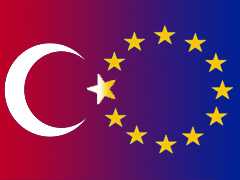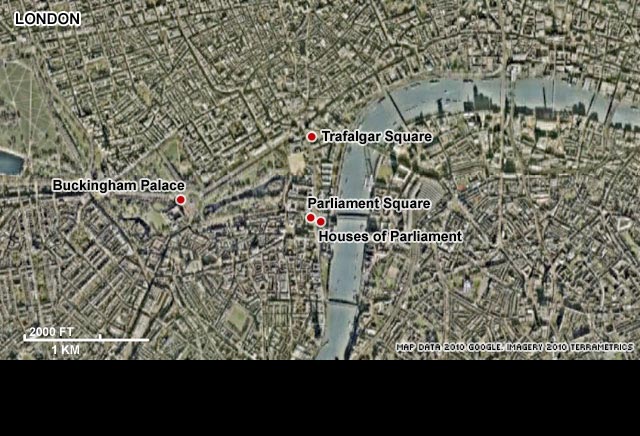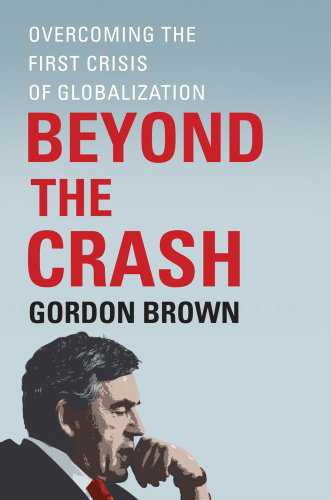I realize that this was not a unanimous decision and that some prudent members considered the motion tabled by an Armenian (Cllr Iskanderian) one sided, without input from responsible opposing views and hence, judged it ill-advised and divisive. I am also aware of at least one councillor saying “…I have never come across a motion in my nine years on the council that so blatantly sought to pitch one community against another – especially on a subject which is highly sensitive and where no member of the council is really able to make a proper and considered judgment…” I truly appreciate those members who thought that way, but I wish they took the trouble to stay on and vote no so that this blatant and malicious fraud could be thwarted.
Those terrible “War Years” of 1912-1922 (known in Turkish as “Seferberlik Yillari”) brought five consecutive wars—Tripoli (North Africa,) Balkan Wars (twice,) World War I, and the Turkish Independence War, in that order— along with wide spread death and destruction on to ALL Ottoman citizens. No Turkish family was left untouched, mine included. Those nameless, faceless Turkish victims are killed for a second time today with politically motivated and baseless charges of Armenian genocide.
Genocide claims are racist because they ignore the Turkish dead: about 3 million during WWI; more than half a million of them at the hands of Armenian ultra-nationalists; and dishonest because genocide charges blatantly dismiss the six T’s of the Turkish-Armenian conflict.
Historians reject the genocide label: This may explain why more than 69 North American scholars categorically rejected Armenian characterizations of genocide, noting that the non-partisan and reliable evidence unearthed so far points to “…inter-communal warfare fought by Christian and Muslims irregulars…” A majority of European historians who specialize on this topic also reject or criticize this label.
The Malta Trials refuted Armenian claims 90 years ago: If you had heard about the Malta Trials by the Crown Courts in 1919-1921, that never got off the ground due to lack of evidence to support the outrageous Armenian claims, you would not have signed that deceptive edict. ( For your information, the British exiled 144 Ottoman leaders to Malta as war crimes suspects, while scouring the Ottoman, British and American archives for proof and came up empty handed. This paper might explain more: The Armenian Issue: Why The “Genocide” Label Doesn’t Fit )
Britain does not recognize Armenian claims as genocide: You would do well to, at least, heed the advice and policy of Her Majesty’s Government when this same issue was raised in the same biased manner, again with total disregard for the other side of the story.
Here is a journey down the history, a collection of brief educational glimpses into the past:
1894
“…The aim of the Armenian revolutionaries is to foment outbreaks, firstly to induce the Ottomans to react to their violence and secondly to encourage the foreign powers to intervene…” Source: Letter of the British Ambassador Currie to the Foreign Office, on March the 28th of 1894, British Blue Book, N°6, p 57
1896
” …The Dashnaks and Hunchaks have terrorized their own countrymen, they have stirred up the Muslim people with their thefts and insanities, and have paralyzed all efforts made to carry out reforms; all the events that have taken place in Anatolia are the responsibility of the crimes committed by the Armenian revolutionary committees…” Source: Williams, The British vice-consul, writing from Van. (March 4, 1896, British Blue Book, Nr. 8 1896, p.108
1915
“…Concerning the Armenian revolutionaries’ tactics, one cannot expect to think up something more diabolic. Killing Moslems in order to punish innocents, robbing in the middle of the night villages that have just paid, the same day, their taxes. (…) The Armenian revolutionaries prefer robbing their own coreligionists rather than fighting against their enemy ; it’s in order to make their compatriots murder that the Armenian anarchists in Constantinople do bomb attacks…” Source: Sir Mark Sykes, “The Caliph’s Last Heritage”, London , 1915, p 409-418
1922
“…I was being employed by His Majesty’s Government to compile all available documents on the present treatment of the Armenians by the Turkish Government in a ‘Blue Book,’ which was duly published and distributed as war-propaganda!…” Source: Arnold Joseph Toynbee, “The Western Question in Greece and Turkey : a Study in the Contact of Civilizations,” Boston , Houghton Mifflin, 1922, p. 50.
1923
“…In some towns containing ten Armenian houses and thirty Turkish houses, it was reported that 40,000 people were killed, about 10,000 women were taken to the harem, and thousands of children left destitute; and the city university destroyed, and the bishop killed. It is a well-known fact that even in the last war the native Christians, despite the Turkish cautions, armed themselves and fought on the side of the Allies. In these conflicts, they were not idle, but they were well supplied with artillery, machine guns and inflicted heavy losses on their enemies…” Source: George M. Lamsa, a missionary known for his research on Christianity, “The Secret of the Near East,” The Ideal Press, Philadelphia (1923), page 133
1928
“…A circular was prepared by the War ministry asking the officers to report on the misdeeds of the enemy. According to this circular, exactness was not an essential condition: probability was enough. (…) The most popular lies in England and in America were those concerning atrocities. No war can do without it. One considers that to libel the enemy is a patriotic duty…” Arthur Ponsoby (British Deputy from 1910 till 1918, his book published in 1928 describes propaganda methods used during First World war), Falsehood in War-Time , New York , 1971, p 20-22
1928
“Few Americans who mourn, and justly, the miseries of the Armenians, are aware that till the rise of nationalistic ambitions, beginning with the ‘seventies, the Armenians were the favored portion of the population of Turkey, or that in the Great War, they traitorously turned Turkish cities over to the Russian invader; that they boasted of having raised an army of one hundred and fifty thousand men to fight a civil war, and that they burned at least a hundred Turkish villages and exterminated their population…It is at least time that Americans ceased to be deceived by propaganda…” Source: John Dewey, American professor, The Turkish Tragedy, The New Republic, November 12, 1928
1936
“…Those who in England are loudest in their sympathy with the aspirations of a(n Armenian) people ‘rightly struggling to be free’ can hardly have realized the atrocious methods of terrorism and blackmail by which a handful of desperados, as careful of their own safety as they are reckless of the lives of others, have too successfully coerced their unwilling compatriots into complicity with an utterly hopeless conspiracy…” Source: Lord Warkworth, after paying a visit to Van. ( William Langer, The Diplomacy of Imperialism.)
1964
“…(The Dashnaks)’ aim was by crimes and assassinations to invite Turkish reprisals and massacres, and thus create an international scandal that would attract the intervention of the other powers…” Source: David Thompson, “ Europe Since Napoleon” (Alfred A. Knopf, 1964, 2nd. Ed.)
1976
“… The deafening drumbeat of the propaganda, and the sheer lack of sophistication in argument which comes from preaching decade after decade to a convinced and emotionally committed audience, are the major handicaps of Armenian historiography of the diaspora today…” Source: Dr. Gwynne Dyer, a London-based independent journalist with global exposure, 1976
1999
“…The British Government had condemned the massacres at the time. But in the absence of unequivocal evidence that the Ottoman administration took a specific decision to eliminate the Armenians under their control at that time, British governments have not recognized those events as indications of genocide… Nor do we believe it is the business of governments of today to review events of over 80 years ago, with a view to pronouncing on them. The events of 1915-16 remain a painful issue in relation to two states with which we enjoy excellent relations…” Source: Foreign Office spokesman, Baroness Ramsay of Cartvale, AP News, April14, 1999
2001
“…The Government, in line with previous British Governments, have judged the evidence not to be sufficiently unequivocal to persuade us that these events should be categorised as genocide as defined by the 1948 UN Convention on Genocide, a convention which was drafted in response to the Holocaust and is not retrospective in application. The interpretation of events in Eastern Anatolia in 1915-16 is still the subject of genuine debate amongst historians.” Source: Baroness Scotland of Asthal, expressing the position of the British Government’s on the alleged Armenian genocide in a written response to a question at the House of Lords, February 7, 2001
2001
“…The British government of that time and those that followed considered the massacres of 1915-1916 as a horrifying tragedy. We understand the strong feelings for this problem, given the human losses of both parties. But we do not believe that proofs put forward give evidence that those events must be classified as “genocide” as defined by the 1948 Convention of the United Nations on genocide. (…) The events of 1915-1916 constitute a big tragedy, during which the two parties underwent very heavy losses…” Source: Official Statement by the Embassy of Great Britain in Ankara , July 23, 2001.
…
The Armenian claims of genocide were never brought to court and, therefore, a court verdict a la Nuremberg does not exist. By voting yes on a controversial claim that totally ignores Armenian revolts, terrorism, treason, territorial demands and their Turkish victims during WWI, you are lending credence to unsubstantiated, exaggerated, falsified, and fabricated accusations.
Do you really believe a political body is the place to resolve historical conflicts?
Do you think academia with its research capability and/or legal realm with its “due process” expertise would be better equipped to handle such controversies ?
Do you agree that taking one side in a complex historical conflict is offensive, and unfair to the other side?
Do you see now how grave a mistake it is to honor one side of the story with an official stamp of approval, while totally ignoring the other? Would you like such “lynching” done to your country?
In a democracy, history is made by political institutions but written by historians. The Blois Appeal of 2008 in France , signed by several hundreds of historians, from Europe, North America , and elsewhere, says: “… History must not be a slave to contemporary politics nor can it be written on the command of competing memories. In a free state , no political authority has the right to define historical truth and to restrain the freedom of the historian with the threat of penal sanctions… ”
Muslim, mostly Turkish, victims of Armenian revolutionaries and the treasonous Armenian volunteers of Russian, French and Greek armies are documented in Ottoman archives, Russian archives , American archives (and also Niles & Sutherland,) French archives (Paul Bernard, Six mois en Cilicie, Aix-en-Provence: éditions du Feu, 1929,) and even in Armenian sources
(Haig Shiroyan, an Ottoman Armenian wrote in his Memories: “…The Russian victorious armies, reinforced by Armenian volunteers, had slaughtered every Turk they could find, destroyed every house they penetrated…” Smiling Through the Tears, New York , 1954, p. 186).
The alleged “Armenian genocide” was popularized by Armenian terrorism of 1973-1991. The ARF controlled one of the two principal Armenian terrorist groups:
a) “Justice Commandos for the Armenian Genocide/Armenian Revolutionary Army”
(Francis P. Hyland, Armenian Terrorism: the Past, the Present, the Prospects, Boulder-San Francisco-Oxford: Westview Press, 1991, pp. 61-62; br>
Gaïdz Minassian, Guerre et terrorisme arméniens, Paris : Presses universitaires de France, 2002, pp. 28-37 and 106-109; br>
Yves Ternon, La Cause arménienne, Paris : Le Seuil, 1983, pp. 218-224.)
Scotland Yard banned Hrair Maroukian, the leader of ARF from 1972 to 1994, from entering British soil in Autumn 1984, because British police considered him as the real chief of JCAG/ARA (Michael M. Gunter, “Pursuing the Just Cause of their People”. A Study of Contemporary Armenian Terrorism, Westport – New York – London , Greenwood Press, 1986, p. 111.)
The JCAG/ARA killed around thirty innocent victims and bombed the offices of Turkish Airlines in London airport, on May 24, 1978 and even the offices of British airways in Madrid airport, on January 20, 1980.
The ARF continues to glorify its terrorists, including Hampig Sassounian, jailed since 1982 for the assassination of the Turkish general consul in Los Angeles , Kemal Arikan.
Vicken Hovsepian, sentenced in 1984 by an US court to six years of prison for an attempt of bombing is a member of ARF the leader of the party in USA .
b) Another Armenian terrorist group, Armenian Secret Army for the Liberation of Armenia (ASALA), was actively supported by the Union of Armenian students of UK , who published a pro-ASALA newspaper in London , from 1978 to 1988: Kaytzer.
ASALA killed around forty innocent victims (including at least eight Turkish diplomats), and wounded many more;
ASALA terrorist Zaven Bedrosian was sentenced to eight years of prison by a British court in August 1983, for illegal possession of explosives and weapons, and conspiracy. Mr. Bedrosian admitted during his trial that he wanted to take the Turkish ambassador in London hostage with the hope of exchanging him with the ASALA murderer Levon Ekmekjian, one of the two perpetrators of attack in Ankara airport, in August 1982 (nine tourists were killed, more than 70 wounded.)
ASALA claimed his solidarity with Irish Republican Army (IRA) against “British fascism” (sic).
Ara Toranian, former spokesman of ASALA from 1976 to 1983, who shows no remorse for his violent past, is currently co-chairman of Coordination Council of France’s Armenian Associations.
I hope that you will realize what a grave mistake you have made by taking the words of Armenian propagandists, falsifiers, crooks and terrorists at face value.
…
In summary, if I could manage to raise a grain of doubt in your mind that the Armenian narrative may not be the whole story and that there might be another side, equally ghastly and genuine, where Armenians are the victimizers not the victims, then I consider my mission is accomplished. Thank you for reading.
Respectfully Yours,
